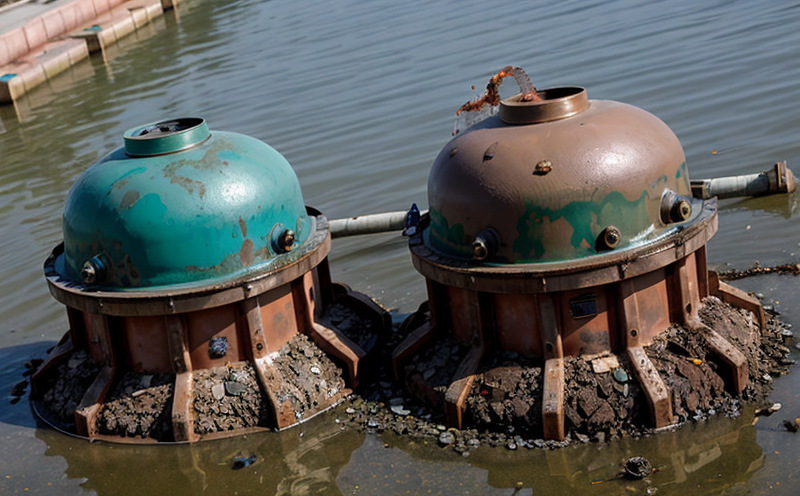ISO 11846 Autoclave Corrosion Testing of Magnesium Alloys
The ISO 11846 autoclave corrosion testing method is a critical procedure for assessing the resistance of magnesium alloys to environmental degradation. This test simulates real-world conditions where metals may be exposed to moisture, heat, and other aggressive environments that can lead to significant material degradation. The primary objective of this test is to evaluate the performance of magnesium alloys under controlled conditions that mimic the stress they might encounter in industrial applications.
Magnesium is a lightweight metal with unique properties that make it attractive for various industries such as aerospace, automotive, and electronics. However, its susceptibility to corrosion, especially when exposed to moisture or high humidity environments, poses challenges that must be addressed through rigorous testing protocols like ISO 11846.
The test involves placing magnesium alloy specimens in an autoclave chamber where they are subjected to elevated temperature and humidity conditions. The environmental parameters can be adjusted according to the specific requirements of the industry or application. For instance, aerospace applications might require higher temperatures and longer exposure times compared to automotive parts which could have more stringent humidity levels.
The testing process begins with proper specimen preparation. This includes selecting representative samples that accurately reflect the characteristics of the magnesium alloys being evaluated. The specimens are then cleaned thoroughly before being placed inside the autoclave chamber. Once in place, the autoclave is sealed and pressurized to create an environment conducive to accelerated corrosion.
During the test, careful monitoring ensures compliance with ISO 11846 standards for temperature, humidity, and time duration. After the specified exposure period has elapsed, the specimens are removed from the chamber and inspected visually for signs of corrosion or other forms of degradation. Any changes in appearance such as pitting, rusting, or loss of material integrity are documented meticulously.
The results obtained from this testing procedure provide valuable insights into how effectively magnesium alloys withstand corrosive environments. These findings can guide manufacturers in making informed decisions about alloy selection and processing methods aimed at enhancing durability and extending product lifespan.
Understanding the mechanics behind corrosion is crucial for optimizing material performance under extreme conditions. By employing ISO 11846 autoclave testing, organizations not only meet regulatory requirements but also contribute significantly to sustainable development efforts by reducing waste generation associated with premature failure of materials.
Why It Matters
The importance of ISO 11846 autoclave corrosion testing cannot be overstated, especially considering the critical role magnesium alloys play in modern manufacturing. As industries strive for greater efficiency and sustainability, ensuring that materials like magnesium can withstand harsh environments becomes paramount.
Corrosion is one of the leading causes of material failure across various sectors. For magnesium alloys, which are inherently prone to corrosion due to their chemical composition, understanding and mitigating this issue through testing is essential. This not only enhances product reliability but also fosters innovation in alloy development and processing techniques.
Incorporating ISO 11846 into quality assurance programs helps companies stay compliant with international standards while demonstrating a commitment to excellence. It allows them to confidently market products that have undergone rigorous evaluation, thereby building trust among customers and stakeholders.
Moreover, the insights gained from this testing method contribute significantly to research and development efforts aimed at creating next-generation materials capable of meeting evolving industrial demands. By continuously improving material performance under extreme conditions, manufacturers can push boundaries and open up new possibilities in design and application.
Industry Applications
| Industry Sector | Common Uses of Magnesium Alloys |
|---|---|
| Aerospace | Structural components, engine parts, fuel systems. |
| Automotive | Fuel tanks, exhaust systems, structural reinforcements. |
| Electronics | Casing materials, heat sinks, connectors. |
| Corrosion Test Parameters | Description |
|---|---|
| Temperature Range | Elevated temperatures simulate hot climates where corrosion is likely to occur. |
| Humidity Levels | High humidity conditions accelerate the rate of corrosion in magnesium alloys. |
Quality and Reliability Assurance
The quality and reliability assurance aspects of ISO 11846 autoclave testing are vital for maintaining product integrity. Rigorous adherence to this standard ensures that magnesium alloys meet or exceed industry expectations regarding durability and performance under adverse conditions.
Manufacturers who implement this testing method can expect enhanced trust from their customers, which translates into improved brand reputation and increased market share. Additionally, compliance with international standards like ISO 11846 demonstrates a commitment to excellence in quality control and process optimization.
The detailed reports generated post-testing provide actionable data that enable continuous improvement within production processes. This includes identifying weak points in current manufacturing methods or raw material sourcing practices that need attention for better outcomes.
In conclusion, integrating ISO 11846 autoclave corrosion testing into quality assurance protocols offers numerous benefits beyond mere compliance. It serves as a cornerstone for innovation and excellence in the materials science field, driving progress towards more sustainable and efficient manufacturing processes.





